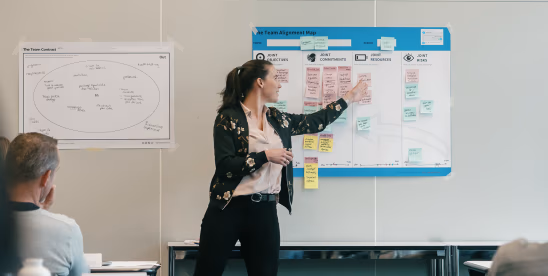Avdullah, can you introduce yourself in a few words for our readers?
I come from the world of insurance, but my background is a bit of a hybrid: both academic and field experience. I've worked in large groups, which has enabled me to build up real professional legitimacy. Today, I've set up my own firm with the ambition of combining this institutional rigour with a more modern and human approach. My aim is to create a structure that combines sector expertise with practical, useful digital tools.
You are currently completing the DAS in Strategic & Digital Marketing. What motivated you to join this programme?
We're in the middle of developing our digital ecosystem: CRM, mobile application, management tools, etc. It was important for me not to do things blindly. I wanted to understand the logic behind marketing so that we could better position our products, anticipate needs and give meaning to what we create.
Your insurance firm recently created a buzz with videos totalling over 800,000 views on TikTok. Can you tell us more about this success story?
It started with a module on social networks in training. We talked about TikTok, which companies are still not investing in very much. I said to myself, ‘Why not? The idea was not to sell, but to offer educational content, to explain situations that I encounter every day in my office. Above all, I wanted people to see Assure SA as a reliable voice, not as a box that pushes sales.

Social networks
Where did the idea of launching your practice on TikTok come from?
Frankly, I launched it without a script, in ‘live’ mode, with just a background in the Assure SA colours. I took concrete subjects, problems that people encounter: double membership, cancellations, unsolicited calls... things that everyone experiences but that few people really understand.
What was your initial objective with this content?
The aim was to raise awareness. To help people understand their rights, their options. There was no desire to sell. What I wanted was to be recognised as an expert, not a salesman. To bring clarity to a sector that remains fairly opaque.
When you saw the views explode, what was your first reaction?
Honestly, I'm not surprised. These are subjects I deal with on a daily basis. I knew it would resonate. What really struck me was the quality of the feedback: no negative comments, just thanks. It confirmed to me that there was a real demand for reliable and accessible information.
What feedback have you had - from your customers, your team or even new prospects?
I posted four or five videos over a short period. The result: 1,100 subscribers, 5,500 likes and 880,000 views. A few contacts were made, but that wasn't the aim. It was a test, a way of taking the temperature of the market. In any case, I wouldn't have been able to absorb an influx of customers. The idea was really to gain visibility, not to convert at any price.
Has the DAS social networking training influenced your strategy or approach to TikTok?
Yes, especially afterwards. The course helped me to structure my approach and better understand the specific characteristics of this channel. Training at HEC is like training for managers: it's all about strategy, not operational tutorials. But that's precisely what it helped me to do.
What have you learnt on this course that has helped you create more effective content?
Above all, I've acquired a solid grounding in marketing. It's like learning the Highway Code before driving. What I liked is that there is no ‘right’ answer. You have to test, observe and adjust. It taught me to evaluate my actions and iterate, without trying to control everything from the outset.
Was there a trigger or key moment during the training that pushed you to take action?
The exam was a good excuse. Without it, I would probably have postponed the launch. The academic setting gave me the opportunity to put into practice what I'd learned in class, and that's invaluable.
What do you think are the key elements of content that works well on social networks?
You need to set the right framework: who is talking, why, and to whom. My hook is the problem I'm going to address, and my legitimacy to talk about it. I'm not there in a suit to get clients. I'm there to explain, to help. What works is understanding the needs of your audience. I've even tested videos with AI avatars: the result was 150,000 views in real life, 20,000 with AI. The human being remains irreplaceable.
You're in a rather ‘traditional’ sector. Do you think that all companies, even in more traditional sectors such as insurance, have an interest in investing in TikTok?
Not necessarily. I can experiment freely, but in big companies there are too many constraints: branding, institutional tone, etc. It breaks the spontaneity. It breaks the spontaneity. And often they replicate the same content as on other platforms. TikTok is a different language. You have to play the game. You can get visibility, but conversion? Not sure. Unless you offer educational content from real experts.
How do you keep the right balance between the professional tone and the fun side of social networking?
I'm not trying to be fun. There's no need for that. Insurance is first and foremost human. What counts is authenticity. If you try to be light-hearted or funny, you risk destroying the credibility you've built up elsewhere. Just be yourself, that's what connects with people.
How do you plan to build on this success in the future? Do you have a strategy in mind?
The idea is to continue to build Assure SA's visibility as an expert reference, without commercial pressure. We're developing an app that allows users to download their documents and manage everything easily. And I'm also going to promote my training institute to pass on this knowledge.
What advice would you give to other professionals who are hesitating to get started on social networks?
First, become a real expert in your field. Then train in digital codes. And finally, do your own cooking. You have to understand your audience, test yourself, sometimes fail, but above all move forward.
And what would you say to those considering the DAS in Strategic & Digital Marketing?
The strength of a training course lies in the people involved. Their experience, their vision. You have to arrive with a clear objective. In each module, I asked myself: ‘What can I do with this in concrete terms? It's a course where you take what you can activate in your own context.
A final word? Any anecdotes or thoughts to share about your digital journey?
Never underestimate the power of difference. What makes you unique is your greatest asset. Stay authentic, without playing a role. And a little anecdote: after the TikTok video, a man recognised me in the metro. He asked me if he could work for me. That's when I said to myself: OK, there's potential there.




